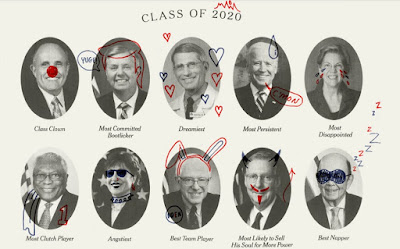It was a remarkable year for the economy. As the pandemic surged in early spring, financial markets and the global economy nearly collapsed. Then central banks responded forcefully and risk assets rallied furiously, even as the real economy continued to struggled. The yawning gap between the haves and haves-not has only grown wider as businesses adopted to the pandemic.
Driving many of the changes was the Tech sector, which had been disrupting and transforming business for years. The Covid-19 pandemic sharply accelerated trends already underway. These charts taken from the amazing Visual Capitalist chronical a turbulent year (click to enlarge):
March 2020: Historic unemployment as the US economy goes into lockdown
May 2020: Aided by technology world starts to work from home. A small company called Zoom becomes a verb (and bigger than the global airlines industry)
June 2020: Tesla-mania!! The electric carmaker surges to become the most valuable automobile company in the world and just keeps going...increasing ~700% y-o-y by year-end
July 2020: Big Tech dominates business and drives a wild bull market
August 2020: Back-stopped by central banks in Spring, investors piled into risky assets leading to the shortest bear market in history
November 2020: The CARES Act, supportive monetary and fiscal policies helped stabilize the real economy. But the recovery was uneven and most Americans continued to struggle
Jan-Dec 2020: The nation's gaping wealth inequality was even more stark at the top. In 2020, the richest Americans increased their wealth by $1T





















































